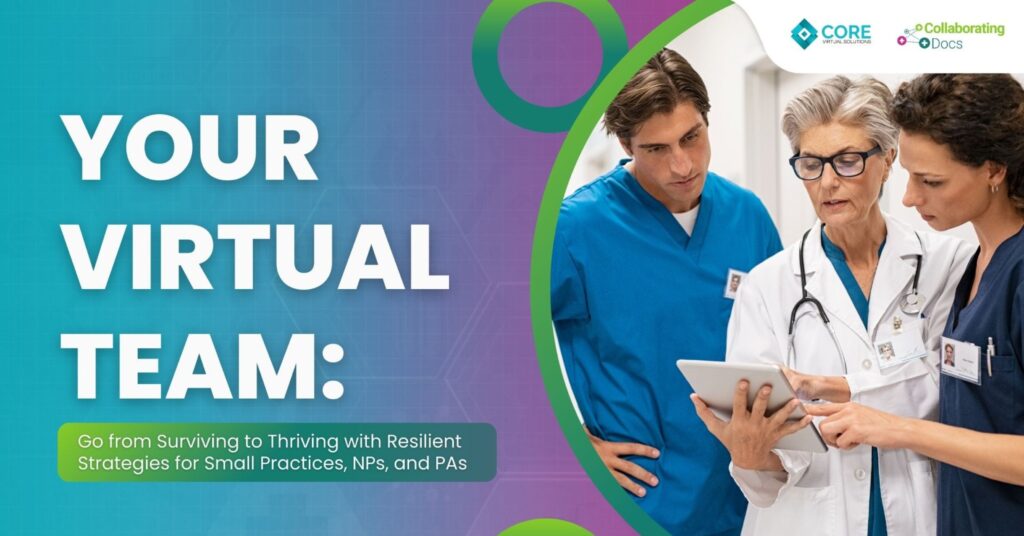Small practices, nurse practitioners (NPs), and physician assistants (PAs) face growing challenges in healthcare. Increased patient loads and administrative work make it hard to maintain efficiency and quality patient care. The recent webinar titled “Your Virtual Team: Go from Surviving to Thriving with Resilient Strategies for Small Practices, NPs, and PAs” delivered crucial insights on unlocking resilience and thriving in the healthcare industry.
Core Virtual Solutions hosted this insightful session with one of our pioneer Affiliate Partners, Collaborating Docs, and featured industry leaders Cameron Ventura and Dr. Annie DePasquale. They shared actionable strategies for unlocking resilience in healthcare, reducing burnout, and empowering small practices.
Let’s explore some key takeaways from the webinar, highlighting the critical strategies for unlocking resilience in healthcare teams and addressing the most urgent challenges in today’s healthcare environment.

The Urgent Need for Resilience in Healthcare
Global crises, especially the COVID-19 pandemic, have reshaped the healthcare landscape, leaving small practices struggling. As discussed in the webinar, resilience in healthcare is more than just a buzzword; it’s an urgent necessity.
Healthcare professionals face unprecedented challenges, including staff shortages and overwhelming service demand. According to data from the Centers for Disease Control and Prevention (CDC), outpatient visits in the U.S. surged to 900 million per year, with only 2.67 doctors available per 1,000 patients. Experts project that the shortage of healthcare providers will worsen, with a potential gap of 37,800 to 124,000 physicians by 2034. As patient demands increase, burnout, reduced care quality, and lower satisfaction levels worsen for providers and patients.
Unlocking resilience for healthcare providers means addressing these challenges head-on through innovative solutions. This can allow small practices, NPs, and PAs to reduce their workloads and recover from setbacks.

Leveraging Resilient Virtual Solutions
Dr. Annie DePasquale, founder of Collaborating Docs, defined resilience and why it matters. Stating that it’s the ability to recover from challenges or stressful situations, “I’d like to think of resilience as the rubber band of healthcare. No matter how much you’re stretching it, it snaps right back. Resilience isn’t just about bouncing back though, it’s about bouncing back even stronger.” Dr. Annie says.
The most effective way to combat these challenges is by building resilient teams that can adapt to changes in patient demand, administrative workload, and global healthcare trends. Resilience isn’t about eliminating stress, but about managing it effectively.
Burnout is a growing problem in healthcare. Over 50% of clinicians experience symptoms such as emotional exhaustion, depersonalization, and reduced personal accomplishment. Dr. Annie made an analogy of comparing burnout to a slow cooker wherein everything seems to be okay until the lid flies off having chaos ensues. Similar to having high patient loads and administrative burdens, it bubbles up leading to exploding burnout.
Burnout is especially challenging for small practices and independent NPs and PAs, who often lack the support systems of larger institutions. This issue contributes to higher turnover, and mental health challenges, and negatively impacts patient outcomes. Many healthcare providers are leaving traditional clinical settings due to burnout, seeking autonomy and better work-life balance in private practices, telemedicine, and concierge models. Collaborating Docs and Core Virtual Solutions support these transitions, offering collaborating physicians for compliance and virtual teams to reduce clinicians’ administrative burdens.

Building Resilient Teams
The webinar highlighted how virtual staffing solutions, particularly virtual medical assistants (VMAs), create a more sustainable work environment by managing non-clinical tasks like scheduling, billing, and record-keeping. By offloading these duties to VMAs, healthcare providers can focus on patient care, reducing burnout and improving work-life balance. More than stress relief, virtual assistants are essential to helping practices thrive; they seamlessly support telehealth services by handling administrative workloads, ensuring continuity of care, and freeing providers to see more patients as telemedicine gains prominence.
Click here to read all about Beyond Borders: Expanding Care with Virtual Medical Assistants
In one remarkable case study, Dr. Adeeti Gupta, a gynecologist and sexual health expert, was highlighted. She was initially overwhelmed by incoming and outgoing patient calls, a challenge that detracted from her core clinical duties. After hiring a virtual assistant, her call management improved significantly, with her practice handling over three times the volume of patient communications. This example serves as a testament to how virtual assistants can help small practices scale efficiently without sacrificing patient satisfaction.
Moreover, virtual assistants offer valuable support during crises. Practices using virtual medical assistants can handle sudden demand spikes, whether from pandemics or flu seasons. Virtual assistants enhance operational resilience, helping practices remain functional during high-demand periods.

The Role of Physician Collaboration in Building Resilience
During the webinar, we highlighted Collaborating Docs. A partner organization that plays a pivotal role in connecting NPs and PAs with collaborating physicians, ensuring compliance with legal requirements and enhancing patient care quality.
Dr. Annie DePasquale, founder of Collaborating Docs, emphasized the importance of physician collaboration, particularly in high-stakes health situations. Physicians provide crucial oversight, ensuring best practices are followed while supporting NPs and PAs in their decision-making processes. Collaboration isn’t just a legal necessity—it’s also a vital component in creating a healthcare team that can withstand crises and ensure optimal patient outcomes.
Dr. DePasquale shared a success story about Sarah, an NP who started her own practice after burnout. Her challenge came when she needed to find a collaborating physician to meet state requirements. Collaborating Docs helped her connect with the right physician, enabling her to run a thriving practice while maintaining a healthy work-life balance. This story demonstrates how the right partnerships can help healthcare professionals overcome burnout and legal challenges, unlocking resilience along the way.

Taking Action to Unlock Resilience
The webinar underscored that unlocking resilience in healthcare is not just about surviving—it’s about thriving in an increasingly challenging environment. Whether it’s through leveraging virtual medical assistants, fostering physician collaboration, or implementing effective teamwork strategies, the tools to build resilience are within reach for small practices, NPs, and PAs.

Ready to Unlock Resilience in Your Healthcare Practice?
By integrating virtual staffing solutions or collaborating with the right physician, you can reduce burnout, enhance patient care, and build a resilient practice that thrives. Don’t wait—take the next step toward a more sustainable and balanced practice today! Click here to schedule a free Discovery Call and learn how our tailored virtual solutions can transform your practice!








